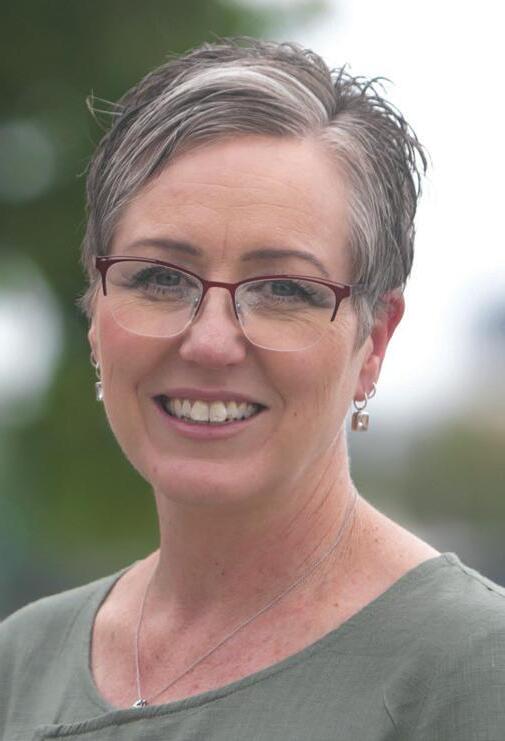
5 minute read
Setting our sights on safety, scope and nursing leadership
Some of you may not be aware that as a member of the Queensland Nurses and Midwives' Union you are also a member of a Branch of the Australian Nursing and Midwifery Federation. The ANMF is a highly regulated union made up of state and territory self-governing branches, some of which, such as the Queensland (QNMU) Branch, also have counterpart state registered unions. If you are a member of one of the state or territory branches, you’re a member of the national union too. Collaboratively, we are the largest union in Australia with over 320,000 members. Together we work to advance the nursing, midwifery and care professions and fight for the conditions required to deliver safe, quality care.
In February, elections were held for the Secretary, Assistant Secretary, President and Vice-President federal positions and those who were in those positions, Annie Butler, Lori-Anne Sharp and James Lloyd, and myself as the Federal President were elected unopposed for another term.
Advertisement
The ANMF and the Branches were very active in the lead up to last federal government election, lobbying to secure long-needed change to the broken health and aged care system in Australia. This includes promoting how nurses, midwives and care workers can contribute to fixing the issues and ensuring safe care.
Our strategic priorities as a Federation include:
Equipping nursing and midwifery professions to deliver safe, quality care in all settings and being prepared for the future through work with NMBA and other national groups in aged care, rural health, and the Coalition of National Nursing and Midwifery Organisations. The ANMF supports the professional growth of all levels of the nursing and midwifery professions, from early-career nurses and midwives to Nurse Practitioners; and supports exploring opportunities from digital health, and rural and remote practice, to the use of medicines and more.
Ensuring professional and personal safety and wellbeing of nurses, midwives and carers in all environments through lobbying and campaigning for pandemic leave and other protections through the Fair Work Commission and other cases to change law in work health and safety regulation; family and domestic violence leave; the Aged Care Work Value Case and updates to the Nurses Award 2020
Positioning nursing and midwifery as informed, expert commentators and advocates on health and change, early learning reform and most particularly aged care. The ANMF and members from around the country have been front and center in all stages of the Royal Commission into Aged Care, and now lobby the federal government to commit to reform of the health system as a whole.
Developing evidence to inform and influence national health and aged care policy, and promote alternative policy where needed through the ANMF National Policy Research Unit which analyses the impact of key national health workforce and funding policies, develops submissions and reports on matters relating to nursing, midwifery or care work at the national level.
As we enter a new term, and working closely with the staff of the federal office and the elected officials of the state and territory branches, the ANMF will remain focused on releasing capacity of nurses and midwives to support health service delivery in all settings in Australia.
We will continue lobbying and campaigning nationally for safe staffing and safe workloads for nurses, midwives and carers in all settings, prioritising our national focus on aged care; lobbying for legislative and policy reforms to support the full use of the nursing, midwifery and carer workforce, advocating for innovation in workforce models, scope of practice, the preparation of nurses and midwives educationally, and committing to assist the growth and training of a culturally safe and diverse nursing, midwifery and carer workforce.
The recent change of federal government presents us with an opportunity to be heard… lobbying for the change we need to see in federal health planning, reform, funding and policy for the future health of all Australians. Together, when we raise our voice, we will be heard!
QNMU COUNCIL president :
Sally-Anne Jones vice president :
Lucynda Maskell secretary :
Beth Mohle assistant secretary :
Kate Veach councillors :
Julie Burgess ■ Christine Cocks
Madonna Cameron ■ Karen Cooke
Tammy Copley ■ Nikki Emblen
Michael Hall ■ Chris Johnson
Damien Lawson ■ David Lewis
Simon Mitchell ■ Fiona Monk
Emma Murphy ■ Sue Pitman
Cathy Rose ■ Ashleigh Sullivan
Michelle Sunderland ■ Kym Volp
Janelle Taylor ■ Kelly Trudgen
Samantha Woodhouse
ANMF FEDERAL COUNCIL federal president :
Sally-Anne Jones federal vice president :
James Lloyd federal secretary : Annie Butler federal assistant secretary : Anne Sharp branch presidents :
Athalane Rosborough (ACT)
O’Bray Smith (NSW)
Trevor Bason (NT)
Sally-Anne Jones (QNMU)
Jocelyn Douglass (SA)
James Lloyd (Tas)
Maree Burgess (Vic)
Trish Fowler (WA) branch secretaries :
Matthew Daniel (ACT)
Shaye Candish (NSW)
Cath Hatcher (NT)
Beth Mohle (QNMU)
Elizabeth Dabars (SA)
Emily Shepherd (Tas)
Lisa Fitzpatrick (Vic)
Janet Reah (WA)
Study debts reduced for Nurse Practitioners
NURSE PRACTITIONERS who live and work in rural and remote Australia will have their Higher Education Loan Program (HELP) debt reduced under new Federal legislation passed in February.

The new legislation applies to Nurse Practitioners who have an outstanding HELP debt when they start eligible work in an eligible location on or after 1 January 2022.
For Nurse Practitioners the legislation applies to HELP debts accumulated while undertaking an approved Nursing and Midwifery Board of Australia (NMBA) program of study leading to endorsement as a nurse practitioner (Master’s Degree level minimum).
It is subject to certain criteria including the length of the study program, the location and length of the rural or remote work.
For more information visit https://bit.ly/HELPDebt
Latest stats show union workers earn higher salaries
THE LATEST data from the Australian Bureau of Statistics shows workers who are union members earn on average about $300 more per week than their nonunion counterparts.
Data shows the median weekly earnings for unionised employees in August 2022 was $1520 per week, compared with $1208 for employees who were not a trade union member.
The news comes as no surprise to us.
“The recent EB11 outcome for public sector nurses and midwives is a good example of how unions can help workers secure better wages,” QNMU Assistant Secretary Kate Veach said.

“The wage increase of 11% over three years plus a cost of living allowance represents the most significant wage increase from any public sector employer in the country.”
Branches urged to lodge Notices of Motion for Conference
THE QNMU’S online Notices of Motion portal is now open and taking submissions.
Superannuation improvements begin this year

IMPROVEMENTS TO superannuation for Queensland’s public sector employees, which were first announced in mid-2022, will start from July 2023
These changes, which have come about thanks to years of agitation from the QNMU, may significantly improve your super in retirement, particularly for shift workers whose penalty rates make up a substantial portion of their income.
For more information visit: www.qnmu.org.au/super
A Notice of Motion is a written submission from a Local QNMU Branch which is put to state delegates to vote on during Annual Conference.
It is opportunity to put forward ideas about how we as a collective can improve our working lives through the work of our union.
For information on how to draft and submit a motion visit www.qnmu.org.au/motions
The submissions portal will close on 19 April. Any motions lodged after that cutoff date will be held over to next year’s conference.
Nurse Practitioner allowance kicks in early
THE NEW Nurse Practitioner
Allowance introduced under the Nurses and Midwives Certified Agreement (EB11) will be paid earlier than planned.
The allowance along with applicable back payments will now be paid in the pay run of Wednesday, 29 March 2023 to all Nurse Practitioners at the Nurse Grade 8 level; and to those people required to practice as a Nurse Practitioner as part of another role at Nurse Grade 8 level and above.
The allowance is designed to help recruit and retain Nurse Practitioners in Queensland Health and recognises the importance of their skills and experience.







